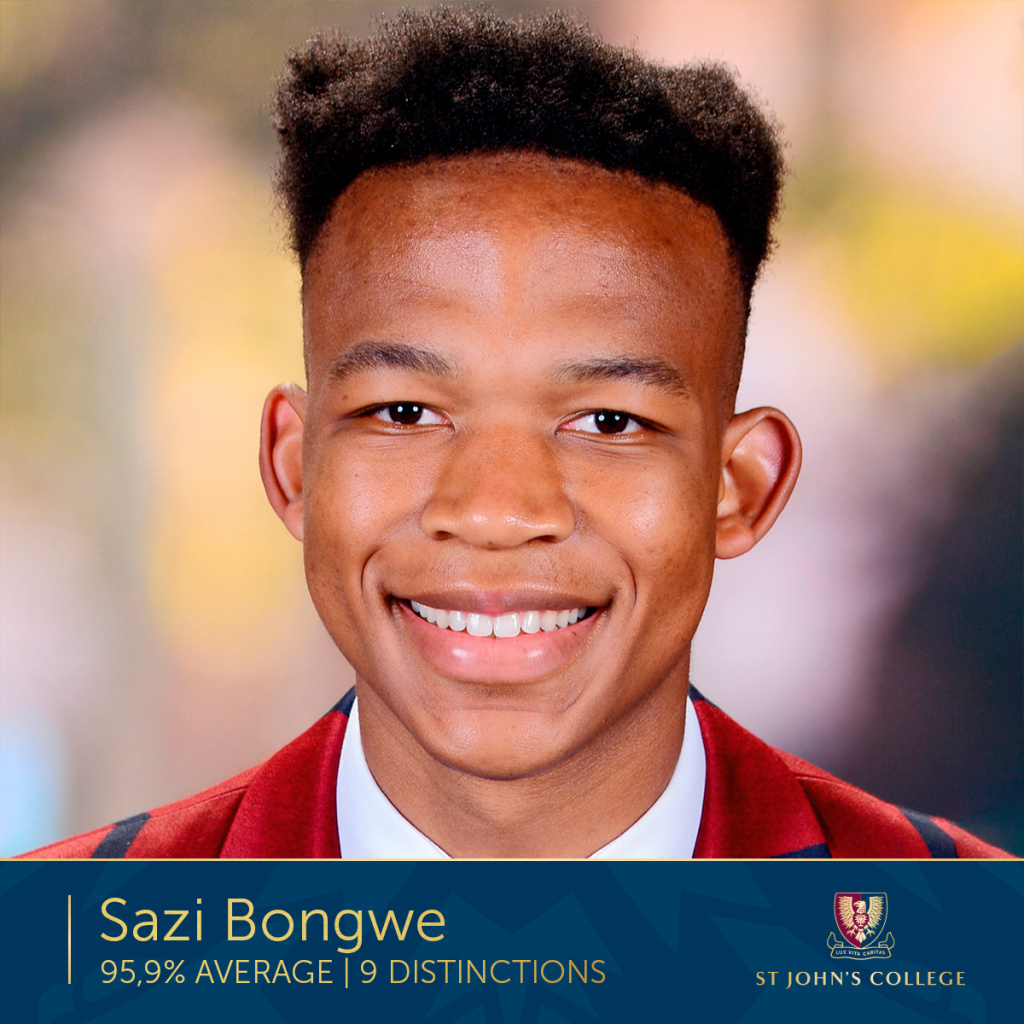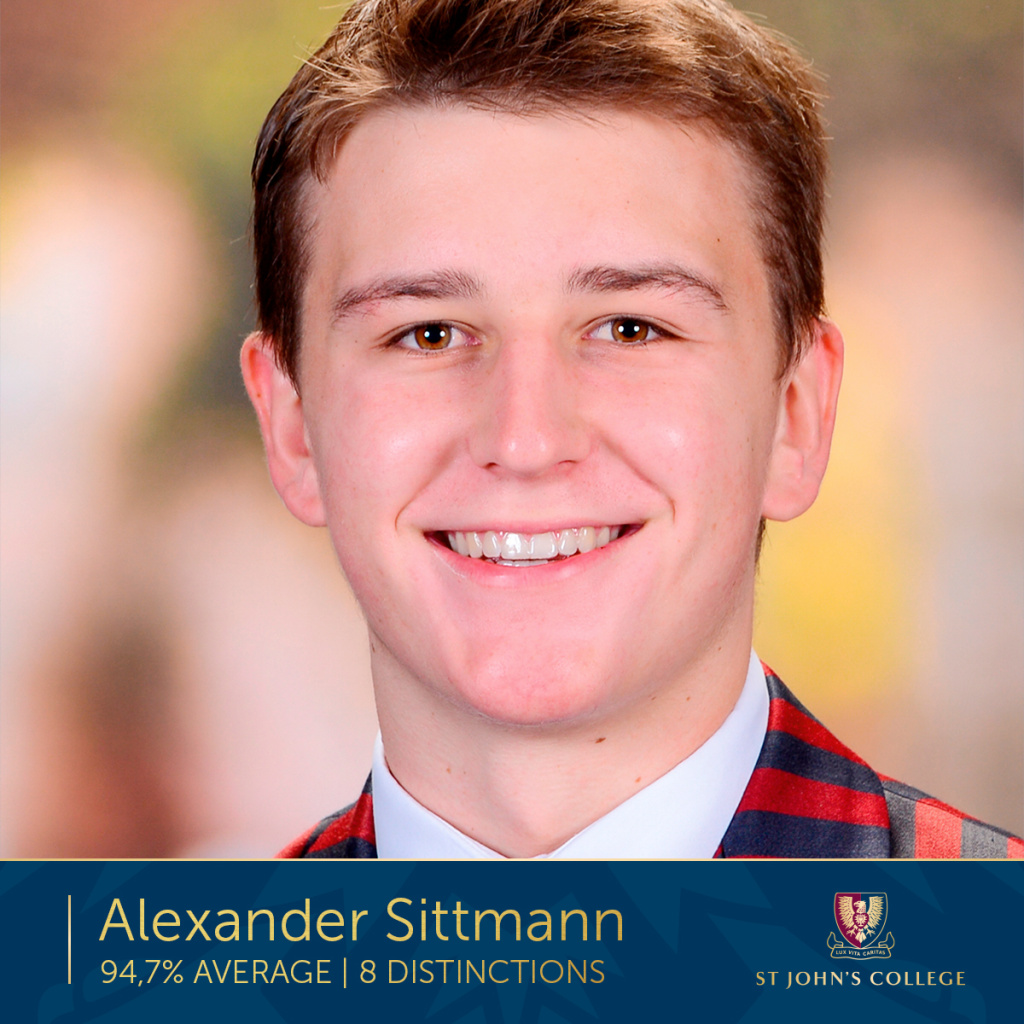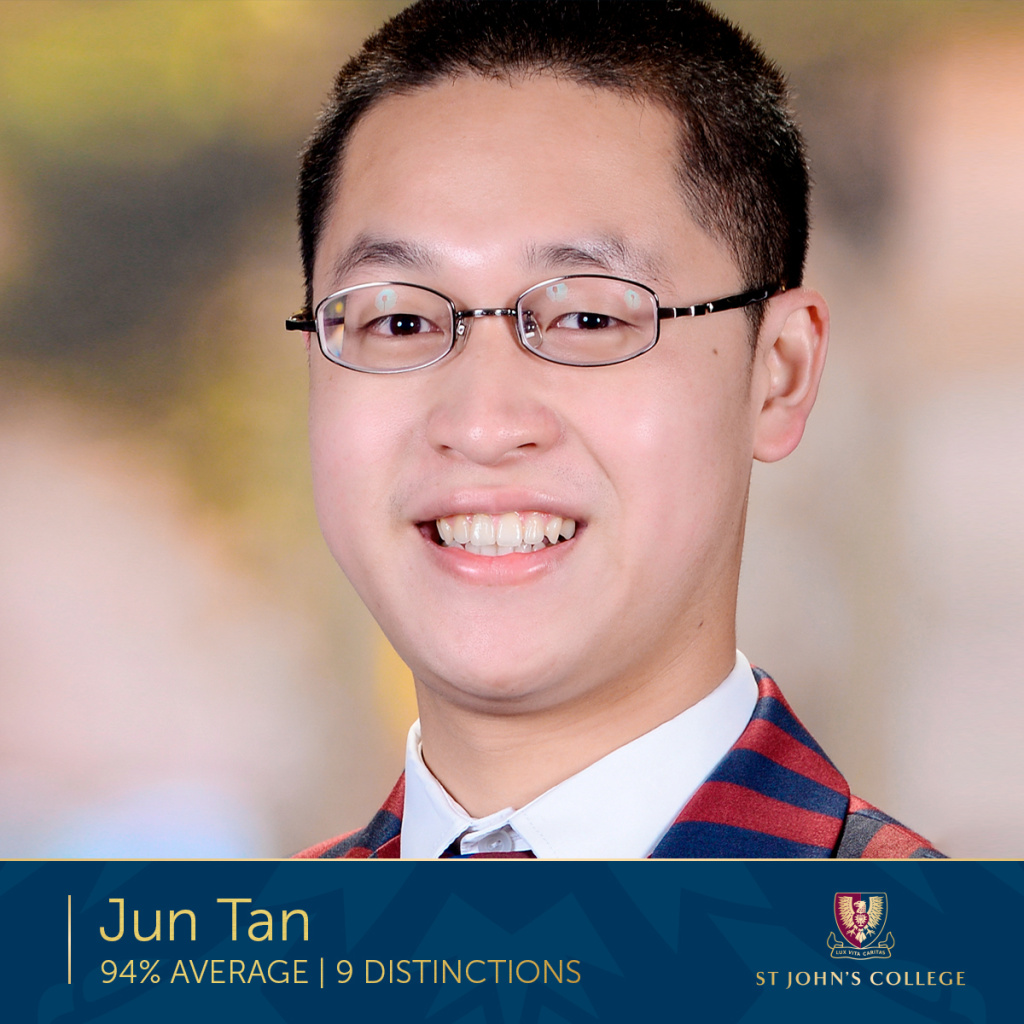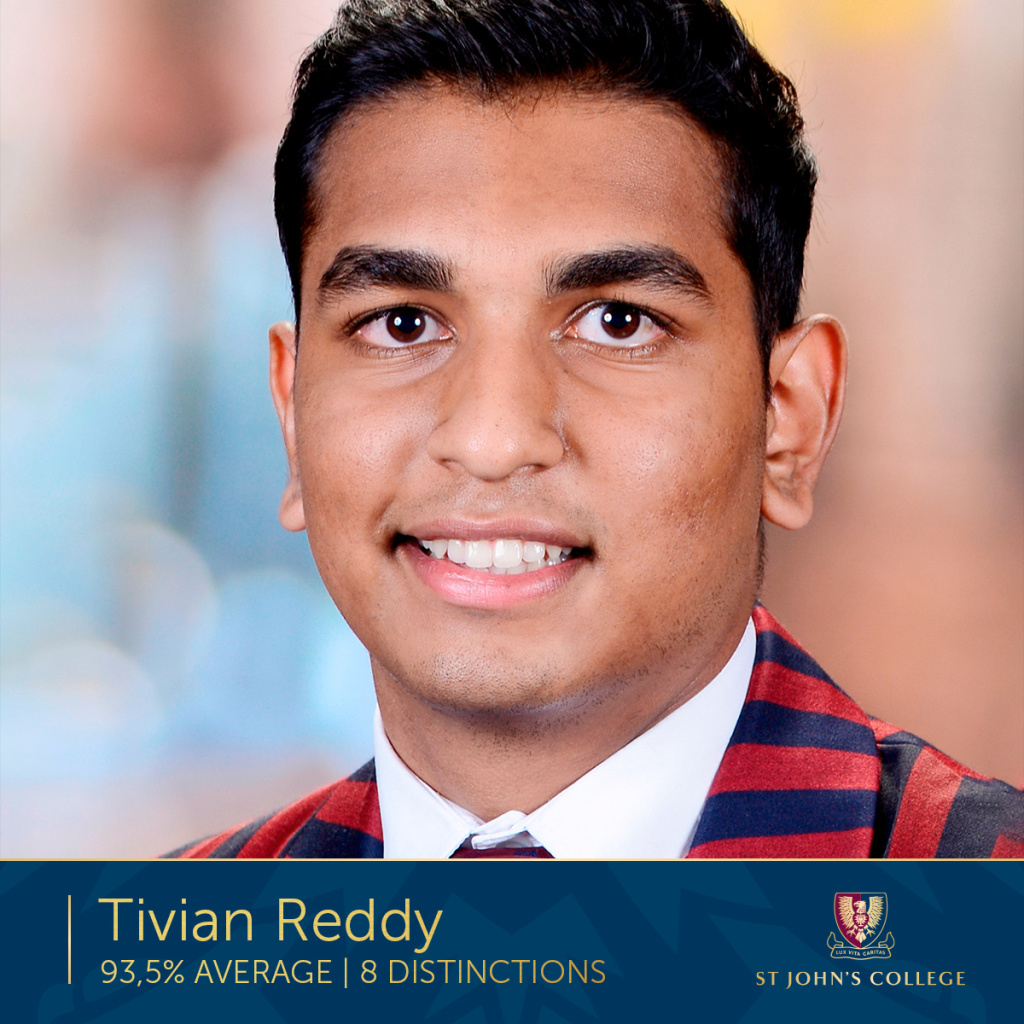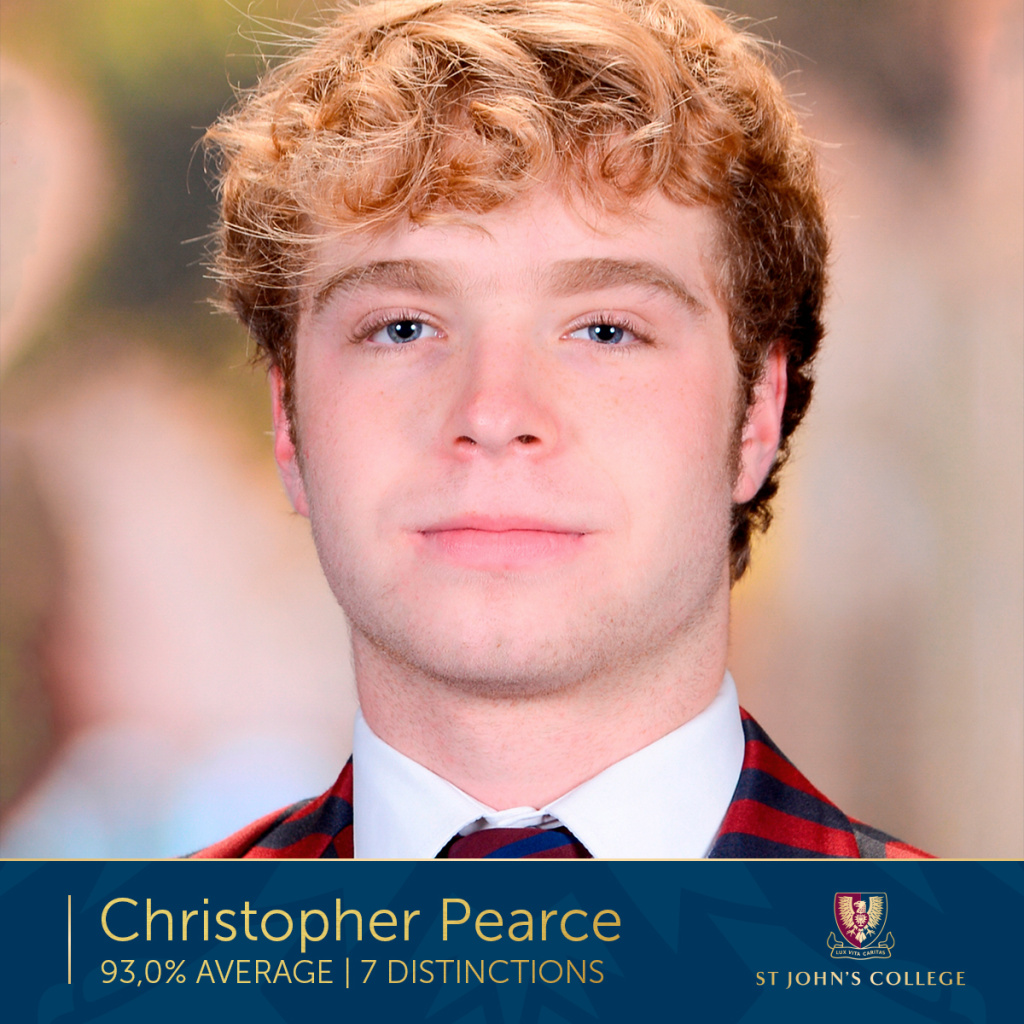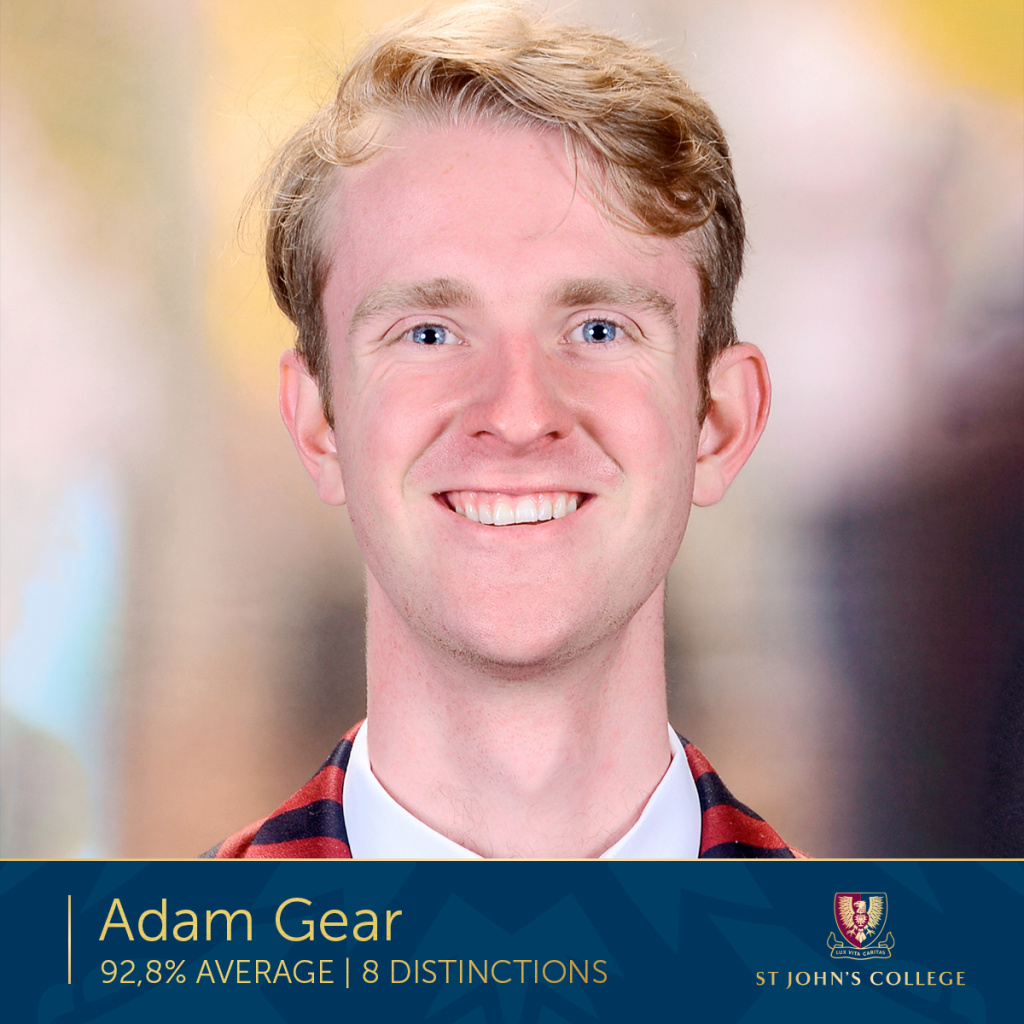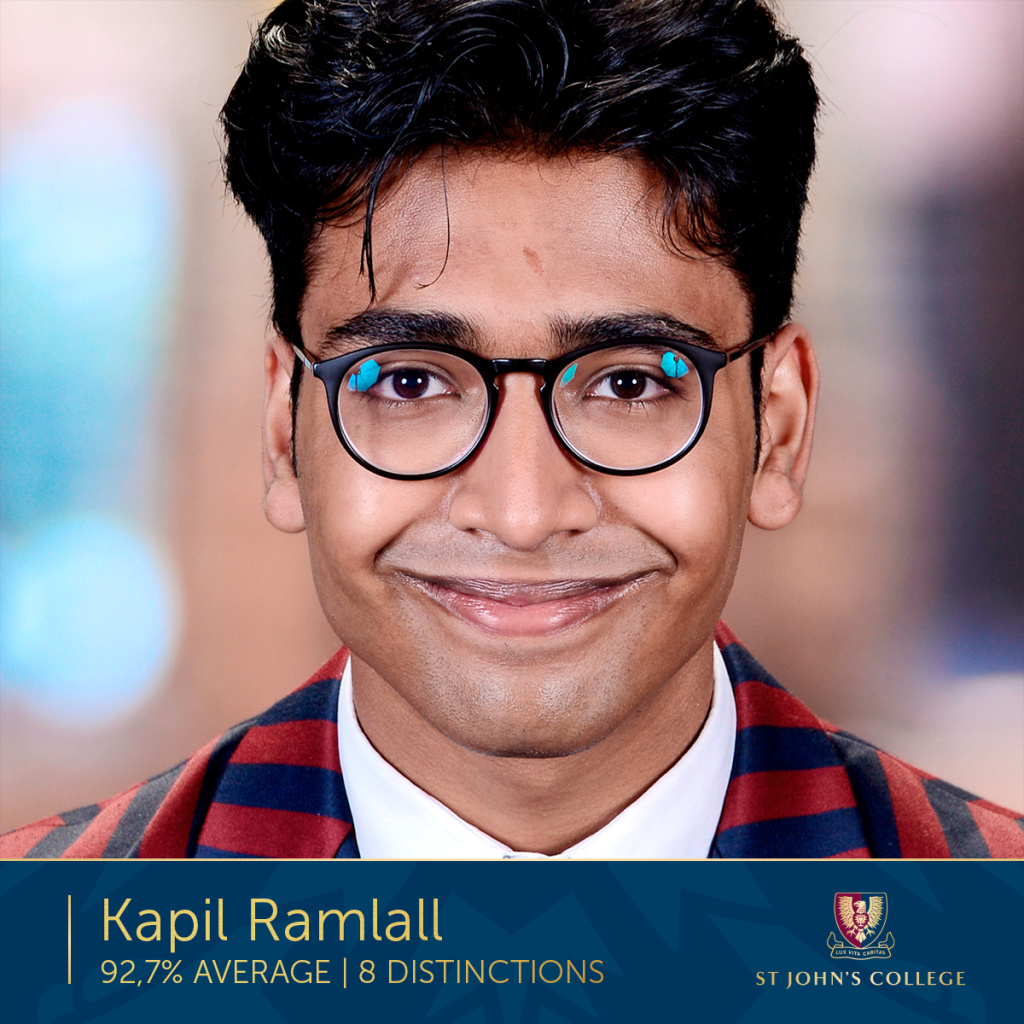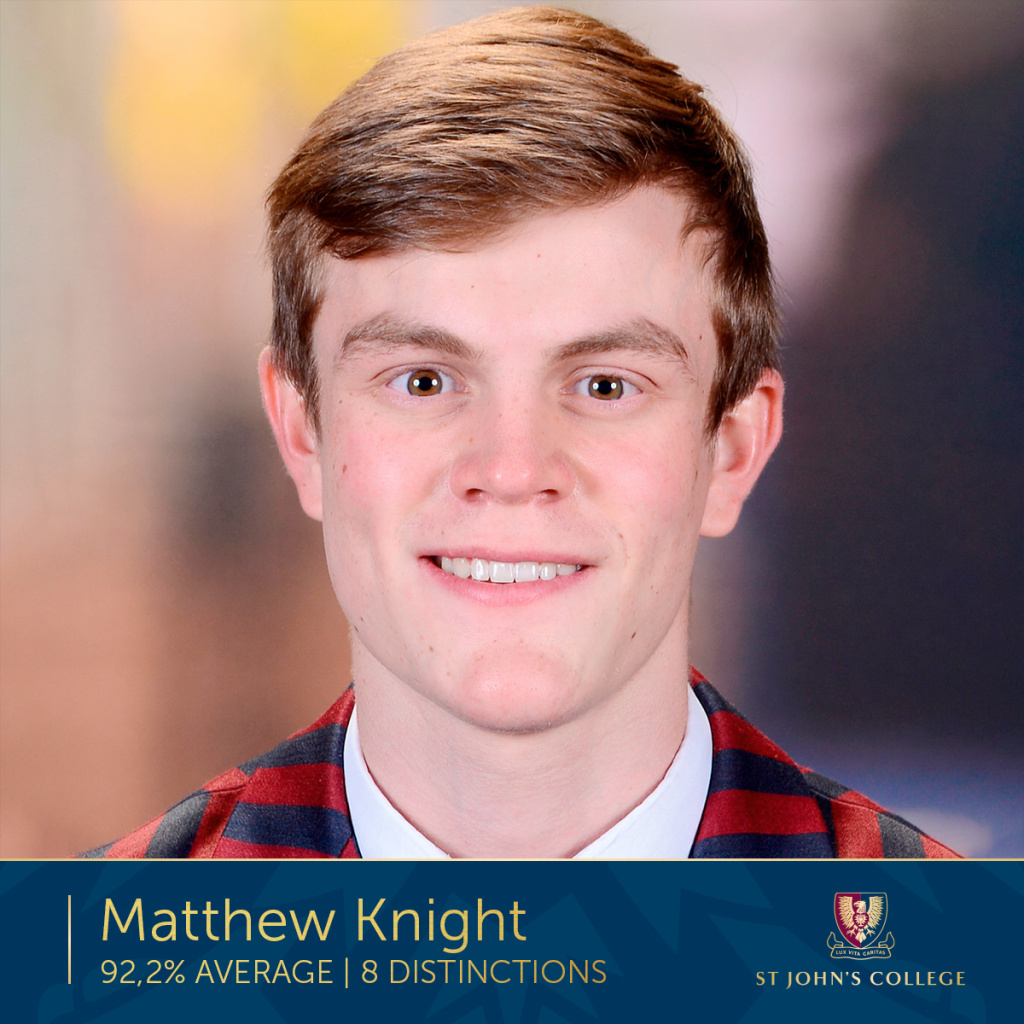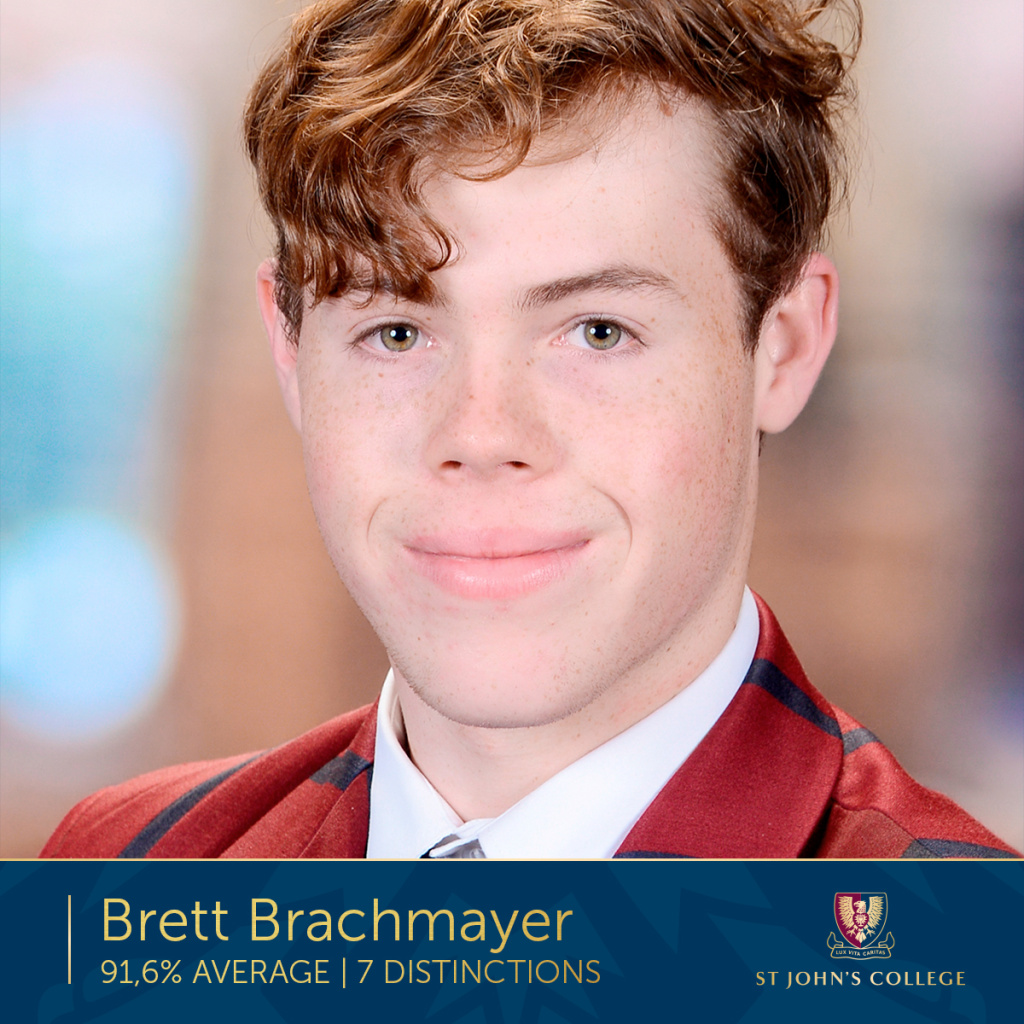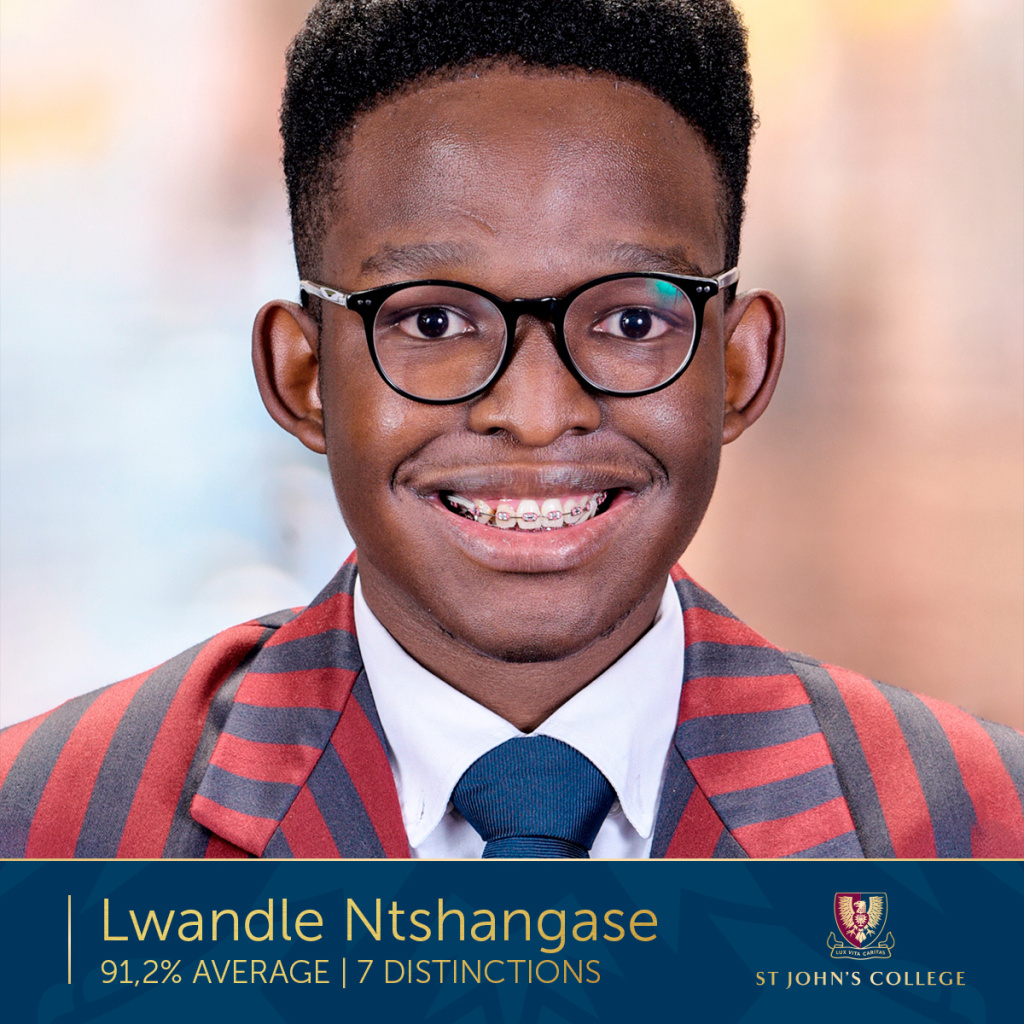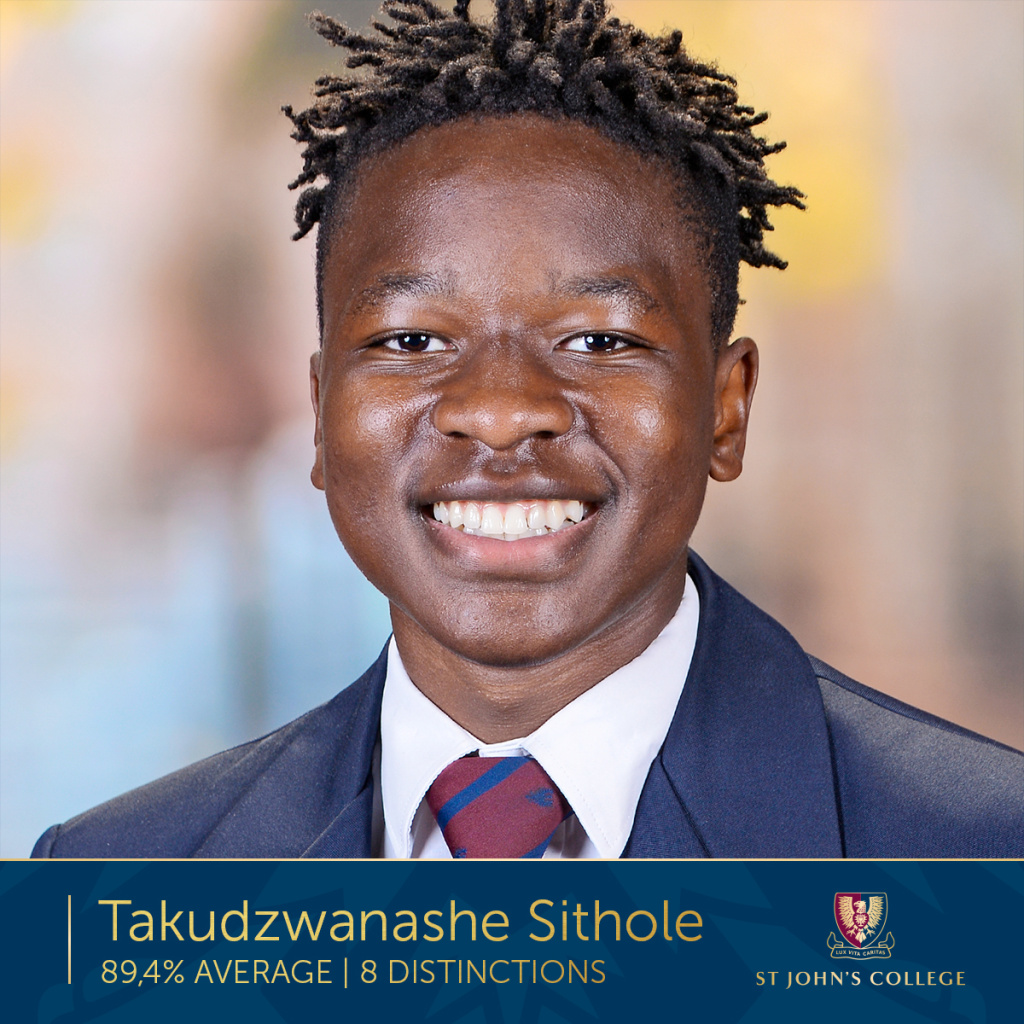Of the 140 young men at St John's College who wrote the matric exams, 15 students achieved an average of 90% and above (10.7% of the class) and one student scored 100% for Mathematics. An average of at least 80% was achieved by 68 boys (48.6% of the group), while 93 boys (two-thirds) achieved at least 75%, and all their names will be etched into the walls of Big School.
Meet our top achievers ...
Sazi Bongwe, Head of School in 2021, is the Top Achiever at St John's College in the 2021 IEB Matric results. He achieved an average of 95.9% and nine distinctions including Dramatic Arts, English Home Language, History, isiZulu FAL, Life Orientation, Mathematics and Physical Sciences as well as Advanced Programme English and Advanced Programme Mathematics.
Sazi is also on the IEB Outstanding Achievements list for being placed in the top 5% of candidates nationally in six or more subjects and in the top 1% of candidates per subject for Dramatic Arts, English Home Language, isiZulu FAL, Life Orientation and Physical Sciences.
At the end of 2021, Sazi Bongwe, Head of School and top achiever in 2021, was admitted to Harvard University after what he describes as "a fairly onerous process, not only academically but in the range of achievement, they require you to prove. It's a very competitive field, and I feel very fortunate to have been successful. The application process, and the support I received from St John’s in this regard, also reinforced my belief in the school as a world-class institution."
Sazi intends to enrol in a degree in Applied Maths and Economics, which, combining as it does hard science and the humanities, reflects his academic journey. But he’s looking forward to the initial period of self-directed study, calling it “an instructive period where you’re put outside your comfort zone.” The Harvard term begins in August, but Sazi will visit the campus towards the end of April and use the opportunity to see his eldest sister, who is currently completing her Masters at Georgetown University in Washington, D.C.
Sazi has epitomised the committed Johannian. “A lot of my time,” he explains, “especially over the past two years, has been spent doing things focused on the school.” Sazi was a first-team basketball player and was also involved in rugby, soccer and athletics. He was a keen dramatist, and one of 21 St John’s boys who performed at the Festival of Excellence in Dramatic Arts (FEDA), where he won a Global Citizens Award for outstanding performance.
Sazi has become a consummate public speaker following his experience debating in his junior years. “I’ve found satisfaction in learning to express myself. Reading a lot has broadened my perspectives, improved my writing, and enabled me to articulate my thoughts in a more formalised way.” Sazi placed second nationally in the 2021 English Olympiad, and was one of the founders, alongside other students from St John's College and Roedean School, of the online platform Ukuzibuza, which means “ask oneself”. Ukuzibuza provides a space for young people to explore issues important to them, “from race to sexuality, to the changing nature of education.”
Sazi joined St John's in LIII. “My first impressions were twofold: that this was clearly a premier institution, deserving of its reputation, and I would somehow have to match up to the calibre of the students there; and that it was a proudly South African school with a storied history. This can be a daunting environment, and one which can weigh heavily on a new boy such as myself.”
As he grew older, and especially after his appointment as Head Boy, Sazi became intimately involved in the transformation journey at St John’s. “I became involved in questions around racial and social justice, around diversity and inclusion. I believe St John’s is heading in the right direction in this regard, and having the conversations it needs to have in order to continue making progress. Speaking to friends at other institutions who have had a more painful experience, I believe that St John’s is notable in the way it has chosen to tackle these complex issues.”
“Now, as I leave, having been Head Boy, and having spent much of my past years involved in conversations at the board and executive level, I have formed a more nuanced view of the school. I leave believing that it is the best education you can receive in South Africa. The ways in which I was encouraged academically, by teachers and classmates, the atmosphere of competition – not in a cutthroat sense, but in a way that encouraged me to expect more of myself – contributed to an environment of excellence in which you can’t easily replicate.”
Finally, and with characteristic humility, Sazi insists that we include a message to his teachers. “People often ask me how I’ve managed to achieve what I have academically as if it’s some secret I possess. But it all comes down to the quality of teachers I was lucky enough to have. I would have been a fraction of the academic performer, and a fraction of the person I am, without their influence. Their dedication to my success grew me exponentially. We're being spotlighted here as students, but our teachers deserve much of the credit.”
Alexander Sittmann achieved an average of 94.7% with eight distinctions including Afrikaans FAL, English Home Language, Latin SAL, Life Orientation, Life Sciences, Mathematics and Physical Sciences as well as Advanced Programme English.
Alex was also included on the IEB Outstanding Achievements list, achieving within the top 5% of candidates in six or more subjects, including Life Orientation and featured in the top 1% of candidates per subject for Afrikaans FAL, Latin SAL, Life Orientation, Life Sciences, Mathematics and Physical Sciences.
Alexander Sittman, who achieved eight distinctions in his final examinations, wrote 10 subjects, including three Advanced Programme (AP) subjects. While most would battle to cope, Alex found the experience “enjoyable overall! My passion for physics drove me to work really hard on the subject, and AP maths was the exam that ended up being the most challenging.”
As he planned his future studies, Alex was torn between physics and medicine. In the end, he opted for the latter and has been conditionally accepted for a medical degree at the University of Cape Town. He was influenced by a family full of medical professionals, including a father in anaesthesia and a brother in traumatology. “Because of the people they are, my family provoked an abiding interest in medicine. I believe there will be opportunities to continue to pursue my passion for physics in parallel.”
Alex joined St John’s in Remove, and since then has “loved almost every minute of it. It did present challenges at times, but it also cultivates a degree of agency and responsibility that prompts its student body to confront and address those challenges.”
“The things I found troubling in Remove and Lower IV – a sometimes-damaging power hierarchy that existed between age groups – we addressed as we grew up and came into ourselves. In my position as Second Prefect, and through our duties as a prefect body, we sought to change that and make it a more welcoming environment, while retaining an ethos of respect for the school and its traditions. We were amply supported by our teachers and, in particular, our headmaster, in this regard.”
A devoted reader, Alex began writing several years ago and has gravitated to poetry. He cites WH Auden and Walt Whitman as favourite poets, and Joseph Heller, Douglas Adams and Jane Austen as prose writers who have inspired him. Alex is also a passionate conservationist, has volunteered with environmental organisations including the Endangered Wildlife Trust, and enjoyed rugby and general fitness.
Alex is effusive when it comes to his teachers. “My teachers were, without exception, fantastic influences on my life, but a few revolutionised the way in which I think and learn. Ultimately, that is what I think teachers ought to do: establish ways of thought and learning, and not simply regurgitate facts. Thank you in particular to Ms Du Plessis and Ms Jacobs, Mr Haysaw and Mr West. Thanks also to my peers and fellow prefects … everyone together created a very special environment for learning and forming meaningful relationships.”
Alex looks forward to maintaining a close relationship with the school. “I’d like to support St John's as best I can,” he says, “to attend Gaudy Days and other events. But beyond the direct connections, I’ll maintain, I will always cherish the common cause we established here and our ethos of friendship and excellence.”
Jun Tan achieved an average of 94% with nine distinctions including Afrikaans FAL, English Home Language, German SAL, History, Life Orientation, Mathematics, Physical Sciences and ABRSM Practical 7 as well as AP Mathematics.
He is also featured in the IEB Commendable Achievements list as well as the top 1% of candidates per subject for History and Mathematics.
Jun Tan, who achieved nine distinctions, didn’t stay up to discover his results, which were released at midnight. He’d been confident in his success since he wrote the exams, nervous only about AP Physics, which had been cancelled and then reinstated, leaving its enrolees without much time to prepare.
Jun, as with students around the globe, found virtual learning a challenge, but only to the extent that without a structured sense of pace it became easy to overwork. “The teachers were fantastic though,” he adds, “and really helped us through this journey.”
Jun joined St John’s in Upper II, and was immediately impressed by the diversity of the student and staff bodies, and the sense of community fostered. Over time he came to appreciate the world-class education (“I can confidently say we have one of the best maths departments in the country”), and the variety of extra-curricular activities on offer. As a result, he “… discovered things I’d never tried before, such as debating and rowing. Despite not being particularly great at them, there’s great value in the unique perspectives new experiences can offer.”
To balance his academic studies and, as a source of entertainment and distraction, Jun has focused on his musical training (he plays classical guitar and bassoon) over the past two years. He is also a sports enthusiast, a fan of Formula 1 and football in particular, and a keen reader. His favourite book of the past year? Les Miserables, by Victor Hugo. “I love immersing myself in the worlds that writers create. Les Miserables tells the story of a man, Jean Valjean, who was spurned by everyone around him, and his road to redemption. I found him to embody aspects of servant leadership which I hold in high regard.”
This concept, of leadership in service to an idea or community, is important to Jun, and an influence on his choice of career. “I’d like to pursue actuarial science at Wits University. I enjoy the subject and South Africa needs actuaries, particularly if plans for a national health insurance come to fruition. In that case, I’d love to be part of the effort to provide equal, accessible health care to all who need it.”
Should the Wits opportunity not transpire, Jun has also applied to several American institutions, where he’d take advantage of the initial period of general education to pursue his interests in history and German before specialising in some form of applied mathematics.
Tivian Reddy achieved an average of 93.5 and eight distinctions in Afrikaans FAL, English Home Language, History, Information Technology, Life Orientation, Mathematics and Physical Sciences as well as Advanced Programme Mathematics.
Tivian is also included on the IEB Outstanding Achievements list, achieving within the top 5% of candidates in six or more subjects, including Life Orientation as well as the top 1% of candidates per subject for English Home Language, History and Information Technology.
“I came from a very small prep school in Johannesburg South”, Tivian Reddy says. “St John's was a massive step up. The whole culture was different. They were both private, Anglican schools but the environment and culture were worlds apart. St John’s was very welcoming, encouraged us to mix and learn from one another. The house system, in particular, earned me lifelong friends.”
Having achieved eight distinctions, Tivian’s available options for tertiary study are wide open, and he hasn’t yet decided between engineering, actuarial science and medicine. “I think my parents would love me to study medicine. It was my grandfather’s dream to be a doctor, but as an Indian, in apartheid, it was difficult for him. I do enjoy helping people, so I can’t rule it out, but I’m also interested in electronic and software engineering, which are competitive, stimulating areas of study, and I love mathematics, hence actuarial science.”
While at St John’s Tivian immersed himself in programming and computer science, activities in which he says he was influenced by his IT teacher, Mr Gill. “He really motivated us to excel”, Tivian explains. “He influenced us to think beyond and go beyond the status quo. He encouraged our class specifically to develop apps, and I had a lot of fun making an educational game that used snakes and ladders to teach Afrikaans.”
Tivian and a friend also developed a phone that works independently of the GSM system, which requires a SIM card and can be costly. Instead, Tivian’s phone uses radio waves to transmit text data and is completely free to use apart from the device cost. Amidst his creative academic career, Tivian found time to excel at swimming (breaststroke and freestyle his chosen events) and water polo.
Christopher Pearce achieved an average of 93% with seven distinctions, including Afrikaans FAL, English Home Language, French SAL, Life Orientation, Life Sciences, Mathematics and Physical Sciences as well as Advanced Programme Mathematics.
He has also been included on the IEB Outstanding Achievements list as well as the top 1% of candidates per subject for Life Orientation, Life Sciences and Physical Sciences.
After the stress of the prelims, which St John’s elected to write before the holidays, Christopher Pearce found the finals, for which he achieved XX distinctions, far easier to prepare for. “They weren’t easier than the prelims, contrary to the prevailing expectations. But because the prelims were pushed forward, we had ample time to prepare for finals, and I was confident as a result.”
Christopher has been accepted to study medicine at the University of Cape Town. His alternate plan was to enrol for a degree in a Canadian institution; he has family there and a Canadian passport.
“I’ve always been interested in helping living things,” he explains. “I considered veterinary science, and am interested in genetics. But towards the beginning of 2020, I entered a job-shadowing programme at Chris Hani Baragwanath Hospital, mainly in the neonatal and paediatric units, and I found my calling. Not for paediatrics specifically (and I also discovered that surgery is not for me!), but for medicine in general. Engaging with people and helping them is what I want to do with my life.”
Christopher was at St John’s for 14 years, which makes direct comparison with other schools a bit difficult. But after the exams, he met matrics from a range of other private schools and was struck by some of the differences in their experiences. “Many of them were surprised by the fact that St John’s has an ethos of excellence and demands the most from its students, and yet does so without being exclusionary or authoritarian. In particular, they were shocked that there were boys in the school who were openly part of the LGBTI community. It made me realise how far we have progressed in terms of transformation, diversity and inclusion. It’s a one-of-a-kind environment in terms of being safe, supportive and encouraging.”
In terms of hobbies and interests, Christopher is “… not that invested in sports, although I enjoyed those I did take part in. I’m a bit of a nerd, I’m not going to lie! For the past two years, I’ve spent a lot of time on the President’s Award. I’m on the Gold level, which has certain associated criteria. For example, you need to consistently be involved in a sport for 12 months – I chose water polo and rugby, and then, once lockdowns took effect, I continued with callisthenics at home; and a skill – mine was learning French. I also went to the Drakensberg and learnt about wildlife first aid, took part in the matric dance committee, and helped out at the St John’s sanatorium and Covid clinic. So participation in the President’s Award has clearly encouraged a range of interesting endeavours!”
Finally, Christopher wanted to emphasise how important his teachers were to his experience at the school. “Many of the teachers became a mixture between educator, friend, mentor and relative. They saw us as much more than marks and scores. The relationships we developed with them had a great impact on our confidence and the way we approach learning and society. They made our time at St John’s truly special, and I am exceptionally grateful for that.”
Adam Gear achieved an average of 92.7% with eight distinctions, including English Home Language, isiZulu FAL, Latin SAL, Life Orientation, Mathematics, Music and Physical Sciences as well as Advanced Programme Mathematics.
Adam has also made the IEB Commendable Achievements list as well as top 1% of candidates per subject list for English Home Language and Life Orientation.
“I loved it,” says Adam Gear of his time at St John’s. “It was the perfect school for me. I can’t imagine a more supportive environment for me personally. The Christian ethos resonated, and the structured environment, in tandem with the breadth of opportunities on offer, allowed me to thrive at my chosen specialities while taking chances with activities I wasn’t familiar with.”
An often overlooked benefit of having the range of extra-curriculars, such as those offered at St John’s, is the opportunity students have to try things they wouldn’t ordinarily. “I would encourage people to do at least one thing”, he explains. “High school gives you a valuable opportunity to fail when the consequences are low. Often people are too risk-averse, and don't push themselves, despite the fact that when we’re in these slightly uncomfortable positions we stand to learn a great deal about ourselves.”
Apart from academics, Adam spent his time debating, running, and playing the double bass. He’s also taken a keen interest in the theory behind philanthropy, especially the field of “effective altruism”, which advocates an evidence-based approach to impactful charitable activities.
Adam has applied to three South African universities to study a general BSc degree, most likely a general maths degree with the addition of Computer Science. “South Africa needs more quantitative skills, and I enjoy the field. I’d like to maintain a degree of versatility in my studies while I decide where I’d like to end up.”
Kapil Ramlall attained a 92.7% average and 8 distinctions, including Afrikaans FAL, English Home Language, Information Technology, Life Orientation, Life Sciences, Mathematics and Physical Sciences as well as Advanced Programme Mathematics.
He has been included on the IEB Outstanding Achievements list as well as the top 1% of candidates per subject list for English Home Language, IT, LO and Physical Sciences.
“I thoroughly enjoy examination periods,” Kapil Ramlall, who earned XX distinctions, enthuses. “I like to get into my own schedule, work at my own pace. It’s the realisation of all the effort you’ve put into studying and learning. It can be very satisfying. Even in the case of AP Physics!”
Kapil is pragmatic when he discusses his future plans. “We’re young, and it’s difficult to imagine all the possible lives to be lived. I’ve considered medicine, nuclear physics and chemical engineering at various points. I spoke to a career-guidance professional, and their advice, which I have taken to heart, was to do something that I won’t get bored with. Engineering has that degree of inventiveness, novelty and flexibility that I imagine will keep me engaged. It also gives you a rigorous foundation on which to work creatively. So I have provisionally enrolled for a Chemical Engineering degree at Wits University, which has a world-class department.”
Kapil was at St John’s for 14 years, having joined the Bridge Nursery School. His mother, Shyrah Ramlall, has been a teacher at the Pre-Preparatory for more than 20 years, so his attendance at the school had always been the plan. He’s never regretted it. “St John’s has a phenomenal reputation, and for good reason,” he says. “I have never found myself saying ‘I wish I could do this, but I don’t have the opportunity.’ The school has mastered the balance between academics, culture and a laudable range of extra-curricular activities.”
As a result, Kapil found himself playing hockey, first-team basketball, singing in the choir, and playing violin in the orchestra. During the lockdown he also picked up a “home-cooked version” of piano, “dabbled” with Photoshop, and learnt the basics of animation. “I sometimes wish I had a keystone hobby,” he says, “but I love learning new things, and can’t help my interest being sparked by all these activities.”
Finally, Kapil offers his thanks, “… just to my friends and teachers and everyone at St John’s. I have an immense feeling of gratitude towards everything and everyone that has helped me to this point.”
Matthew Knight achieved an average of 92.2% and eight distinctions in Afrikaans FAL, English Home Language, Information Technology, Life Orientation, Life Sciences, Mathematics and Physical Sciences as well as Advanced Programme Mathematics.
Matthew has been included in the IEB Commendable Achievements list as well as in the top 1% of candidates per subject list for IT, Mathematics and Physical Sciences.
Even before his results were announced Matthew Knight was fairly confident in his performance. “I put everything else aside last year and focused purely on exam preparation. It was nice to have the exams spread out, and in the end, there weren’t too many bumps.”
Now that his preparation has been validated, Matthew can give some more attention to his passions – hiking and tennis – as he waits to begin his medical studies at Wits University.
Matthew was at St John’s for ten years and always knew that medicine would be the end goal. “I enjoy science and biology”, he says, “and have always wanted to help people. I’m still open in terms of specialisation, but thinking of cardiovascular surgery.”
Reflecting on his time at St John’s, Matthew recalls the impression the school made on him when he joined. “It’s a very beautiful environment, and growing up and increasingly feeling a part of it has been a special and rewarding experience.”
Ydhan Naidoo achieved an average of 92.2% and seven distinctions for Afrikaans FAL, English Home Language, Geography, History, Life Orientation, Life Sciences and Mathematics.
Ydhan is also featured in the top 1% of candidates per subject list for English Home Language, Geography, History and Life Sciences.
Going to St John's,” says Ydhan Naidoo, “is very similar to entering a library; it is up to you to find the area you are interested in. I have had friends who have dived deep into music or who have found their niche in golf or swimming. St John’s is a canvas that allows its students to paint their own picture and forge their own identity.”
Ydhan, who earned seven distinctions, plans to attend university in 2022 and to begin a BA degree, with the eventual intention of entering the legal field, and using his legal learnings to support his community.
Ydhan enjoys reading, both for leisure and for educational purposes, and conducting lively conversations with his peers, which, he says, “opened my eyes to many new perspectives. These conversations not only encouraged me to ‘come out of my shell’, but resulted in countless hours of learning, insight, and humour.”
Ydhan was an avid debater at St John’s College, and enjoyed debating both at school and at a national level. He was also involved in public speaking, though only later in his school career. In 2019 Ydhan represented South Africa at the International History Bee and Bowl and placed fifth, and in the Geography Bee, where he placed second. He also placed tenth in the De Beers English Olympiad.
“But”, he says, “I am most proud of having been able to support the environmental and community-service committees, and am delighted to know that these organisations will continue their much-needed work into the future.”
“Above all, what I have cherished most was working with the community both within and outside of school. Community service is at times seen by some students as a ‘tick-box’ exercise for becoming a prefect, but given the stark inequality faced literally next door to St John’s College, I believe that no Johannion should ever leave the College without a deep understanding of their obligation to use their education to help those around them; an ethos shared by our Community of the Resurrection forebears.”
Brett Brachmayer attained a 91.6% average with seven distinctions in Afrikaans FAL, English Home Language, German SAL, Information Technology, Life Orientation, Mathematics and Physical Sciences.
He also featured in the top 1% of candidates per subject list for Physical Sciences.
Brett Brachmayer, who achieved seven distinctions, was pleasantly surprised when the time came to sit his finals. “I actually found these exams easier than some of the past papers”, he says. “Maybe it’s because we were very well prepared, maybe we were just lucky. Probably a combination of the two!”
Brett attended St John’s from Grade 0, and in the thirteen years since “Nothing exceeded the point of mild irritation. In fact, St John’s has proven itself a genuinely special school. It has an amazing ethos, great inclusivity, and top-tier teaching. The experiences afforded us have been, without exaggeration, life changing. I’ll never forget the Polar Bear swims on the winter solstice (always begun begrudgingly!), or our 28-day Maretlwane camp.
“The latter was the best experience of my life. To end the camp we went on a five-day hike, carrying everything we’d need on our backs. We had stopped by a pool to swim, and in the distance, we saw fires on the horizon. Suddenly the colour of everything changed as smoke obscured the sun. We could see flames at the height of trees, heading directly for us. We took a gap and managed to escape to the neighbouring property. At the time it was terrifying, but it’s something I’ll never forget.”
Brett was popular amongst his peers, winning the Fellowship Award each year he was in Prep and a Lollypop Award upon leaving Prep. “I was voted ‘next Bill Gates’”, he recalls. “I still have the lollypop somewhere, though I’d imagine it’s a bit of a sticky mess by now.”
Brett is, in his words, “not that sporty”. He enjoyed taking part in bottom-team basketball and B-team hockey “for the considerable fun of it”. He is an avid reader, and especially enjoyed The Name of the Wind by Patrick Rothfuss, Frank Herbert’s Dune, and Marcus Aurelius’ Meditations, which he read three times last year. “I’m an aspiring stoic”, he laughs, “and Aurelius helps keep me focused on those aspects of my life that I can control. It’s very helpful in dealing with stress and uncertainty.”
Brett intends to study medicine in 2022 at either Wits University or UCT. Brett’s desire to study medicine was provoked by a chance encounter several years ago on a beach in Thailand while travelling with his family. Two people nearly drowned, and Brett’s father, who is a doctor, was able to assist them before the ambulance arrived. “I couldn’t help thinking about what would have happened if I’d been alone”, Brett recalls. “It was harrowing and cemented my desire to become someone who could help those in need.”
Lwandle Ntshangase achieved an overall average of 91.2% and seven distinctions including English, French SAL, History, isiZulu FAL, LO, Mathematics and Physical Sciences. He was also included in the top 1% of candidates per subject list for English and LO.
Lwandle Ntshangase, who achieved XX distinctions, has been provisionally accepted to study law at Oxford University. As he points out, “I didn't do Sixth Form, instead choosing to take my AS levels in addition to matric. My acceptance is conditional on my performance in May this year.”
“Oxford has been a goal and dream of mine for a while”, he says. “Part of me thought it never really would happen, so it’s very exciting. It’s not as demanding an application process as it would be to a US institution; Oxford required me to write a personal statement, and then of course they look closely at academic results.”
Lwandle’s desire to study law is a relatively recent development. “I’d always been averse to studying law,” he says, “I think because my mom is a lawyer and we’re sometimes reluctant to follow too closely in our parents’ footsteps.” But Lwandle’s experience in the St John’s Debating Club, alongside a growing exposure to legal motions and jurisprudence, saw him come round to, and eventually embrace the field wholeheartedly.
“One of the topics I debated involved an exploration of legislative changes around the world”, he recalls. “My research just went deeper and deeper, I consulted with my mom when my research trails reached dead ends, and the whole experience awakened a fascination with international law. I think it’s an area where a lot of uncertainty lies in terms of how legal actions happen and legal discourse happens, and finding mechanisms of accountability that are internationally applicable is something I would be very interested in.”
Lwandle was involved in debating from his introduction to St John’s five years ago, and it’s the activity that took up the majority of his time outside his academic studies. He was selected for the provincial debating delegations in Grades 10 and 11, and in matric he participated in the World Schools Debating Championship. “There are several aspects of debating which I enjoy and find rewarding. The majority of my friendships have been made with fellow debaters. The competitive aspect has pushed me to improve the way I approach many areas of my life. Intellectually, weirdly enough, the thing I've learnt from debating is to accept a lack of knowledge as a basis. It's a helpful position to begin from and encourages a constant attitude of learning. The knowledge that there's always more knowledge to be gained leads me to avoid complacency.”
This attitude underlies Lwandle’s strong commitment to academia and intellectual curiosity at St John’s. “I remember when I came into Remove, my friends and the environment pushed me to care a lot more about my academic aspirations, but never at the expense of our development as rounded individuals. I feel it's something that makes St John’s unique: this commitment to the nurturing and development of individual character as well as learning.”
Takudzwanashe Sithole achieved an 89.4% average and eight distinctions, including Dramatic Arts, English Home Language, History, isiZulu FAL, LO, Mathematics and Physical Sciences as well as AP Maths. He is also shot the lights out with100% for Maths!
"It was tough”, says Takudzwanashe Sithole of the final exams in which he bagged eight distinctions and scored 100% for the Maths paper. “But when St John’s says they train you right in body, mind and character they really mean it. We were very well prepared, and it showed.”
TJ has been angling for the perfect score for several years, and it was a proud achievement to earn the 100 in the final leg of his schooling. “I just feel so blessed”, he says. “I earned this by the grace of God. I’d come close in the past but had just missed out by a percentage point or two. I hoped I’d done it this time, but after the exam, we had a big argument around the final question in the second paper, so there was still some uncertainty.
TJ’s plans for 2022 and beyond are still to be finalised. He intends to study actuarial science at UCT but also has his sights set on a post-grad placement in a US college, where he’d also love to pursue basketball, his other passion.
TJ’s interest in academics came comparatively late, and at first, was stoked by his competitive nature. “There was another boy in my Grade 7 class who did well, and my interest in academics began through wanting to outdo him. At St John’s I was lucky enough to find myself in Ms Clogg’s class, and she really took my interest in the subject and turned it into something greater.”
“I feel so incredibly lucky to have landed in a grade that was so talented in so many spheres. St John’s evokes a hunger for success, but never at the expense of others. It calls you to a brotherhood, but also pushes you to shine in your individual field. It’s a place where you can really find your potential if you lean in, and I’ve loved it for that.

